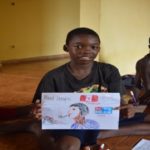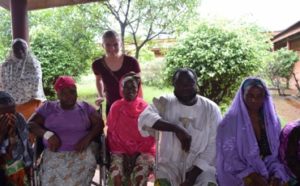We had the pleasure of hosting a volunteer for one month from Canada: Julia Sawatzky. Julia helped our program with the development of an elaborate tool used in recruiting new children into our program. The tool involves collecting data and creating detailed profiles of the children’s backgrounds.
Before starting our program in the area called Nongo, we decided to visit the families of the children who would register for our program. During these visits, we saw that it was truly a relief for these parents and caretakers to know that we – MindLeaps – will always be there to help their children and communicate with them as guardians.
Likewise, it was an important experience for this volunteer to know that we are in direct contact with the people who our program impacts – both directly and indirectly. There are no intermediaries between the service providers and the beneficiaries.
These visits were also informative for the development of the assessment tool.
Our centre allows us to provide assistance to underserved children who do not have the chance to go to school and have little hope for their futures. Thus, the surveys conducted by MindLeaps for the development of this assessment tool included questions about access to education in Guinea and the situations of the most vulnerable youth.
The first profile type we discovered consisted of many families in difficult situations who cannot provide food for their children. The children, driven by hunger, look for something to eat on the streets. Over time, they gradually begin to live on the streets and relocate there.
The second profile type consisted of children who have mothers who are unmarried or widowed; they cannot provide for their children. The children have no choice but to fend for themselves, going onto the streets in search of something to eat. They find themselves doing domestic work or collecting plastic bags of Coyah water for resale. Most of these children had to drop out of school.
The phenomenon of children living on the streets or who have dropped out of school is truly a problem in Conakry.
We have a Centre in Nongo that houses the MindLeaps program with many volunteers and teachers who get to know these children, meet with them on the streets and watch them in the markets late at night. They invite them to our centre to take the first step to change their lives. It is a very difficult and complicated task for these volunteers.
At first, children on the streets tell the volunteers that they couldn’t leave the streets to come to MindLeaps because they need to find food to eat. Then, the volunteers explain that they can eat at the Centre if they follow the program and continue to work hard.
Some of the kids decide to try the program. The children are not really interested in English classes or IT classes, but the reaction to dance class is entirely different. Once the kids hear that you can dance at the centre, they are very interested. They ask what type of dance they can learn there. Dance and nutritional support prove to be the primary ways that these children are attracted to the Centre as a safe space away from street life.
Once at the Centre, we explain the program to the children several times. Eventually, there is an atmosphere of trust. The children feel safe sharing their suffering, and ultimately they open up about their family backgrounds. All of these processes are captured in the assessment tool created by Julia Sawatzky, researcher Kimberly Kamara and the MindLeaps team. This allows us to serve these children and understand them better.
Ansoumane Conde is the Country Director of MindLeaps Guinea.

